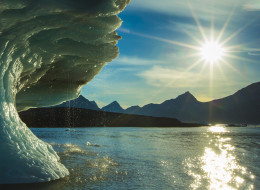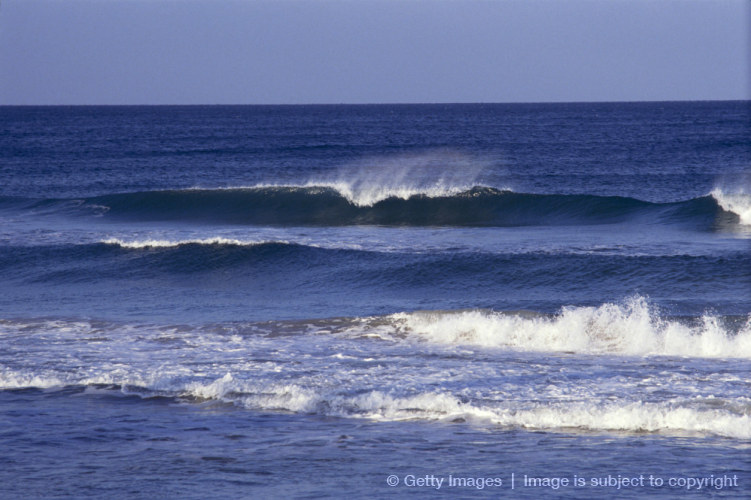 Plenty of studies have shown that the Arctic is warming and that the ice caps are melting, but how does it compare to the past, and how serious is it?
Plenty of studies have shown that the Arctic is warming and that the ice caps are melting, but how does it compare to the past, and how serious is it?
New research shows that average summer temperatures in the Canadian Arctic over the last century are the highest in the last 44,000 years, and perhaps the highest in 120,000 years.
"The key piece here is just how unprecedented the warming of Arctic Canada is," Gifford Miller, a researcher at the University of Colorado, Boulder, said in a joint statement from the school and the publisher of the journal Geophysical Researcher Letters, in which the study by Miller and his colleagues was published online this week. "This study really says the warming we are seeing is outside any kind of known natural variability, and it has to be due to increased greenhouse gases in the atmosphere."
Arctic Temperatures Highest in at Least 44,000 Years
Gulf Ecosystem in Crisis Three Years After BP Spill
 Hundreds of kilograms of oily debris on beaches, declining seafood catches, and other troubling signs point towards an ecosystem in crisis in the wake of BP's 2010 oil disaster in the Gulf of Mexico.
Hundreds of kilograms of oily debris on beaches, declining seafood catches, and other troubling signs point towards an ecosystem in crisis in the wake of BP's 2010 oil disaster in the Gulf of Mexico.
"It's disturbing what we're seeing," Louisiana Oyster Task Force member Brad Robin told Al Jazeera. "We don't have any more baby crabs, which is a bad sign. We're seeing things we've never seen before."
To Fix Climate Change, Scientists Turn To Hacking The Earth
In the summer of 2012, a small group of the Haida people, a native community in Canada, had a problem. The salmon they rely on were disappearing. So the Haida took matters into their own hands.
They partnered with an American businessman, drew up plans and then took a boat full of iron dust into the waters off their home island and put the dust in the ocean.
When they spread the iron dust, it created a big algae bloom. They hoped the algae would soak up carbon dioxide and bring back the fish. The reaction to the experiment was immediate and negative, and as the "world's first rogue geoengineering project."
Global Frackdown: World protests shale gas production
 Thousands of people worldwide are expected to join the Global Frackdown protest on October 19. ‘Fracktivists’ from over 20 countries will gather to demand an end to fracking and “dangerous” shale gas drillings.
Thousands of people worldwide are expected to join the Global Frackdown protest on October 19. ‘Fracktivists’ from over 20 countries will gather to demand an end to fracking and “dangerous” shale gas drillings.
Numerous events are scheduled to take place mainly across the US and Europe with some rallies already having kicked off in the UK, Romania, France and Spain.
Fracking foes in California shift focus toward local limits
 - California fracking opponents, frustrated in their push for a statewide ban, are going local.
- California fracking opponents, frustrated in their push for a statewide ban, are going local.
Santa Cruz County last month slapped a moratorium on the controversial oil and gas production technique. Two members of the Los Angeles City Council have introduced a proposal to do the same. And they hope surrounding cities, some of which sit atop the oil fields of the Los Angeles Basin, follow suit.
"There are probably just two or three pieces of legislation I've ever introduced where random people thank me for it everywhere I go," said Councilman Paul Koretz. "I think if we were to pass this measure, we'd be hearing from cities across the country."
Leak in Canadian natural gas pipeline curbs oil production
The Canadian National Energy Board said it was working to respond to the rupture of a natural gas pipeline operated by TransCanada in Alberta.
The NEB said it was notified by TransCanada of a leak on its Nova natural gas pipeline Thursday. The site of the release is about 85 miles west of Fort McMurray in Alberta province.
Study: All world's oceans to be impacted by climate change by 2100

Scientists say no corner of the globe's oceans will remain untouched by climate change by the end of the century.
In Pennsylvania town, fracking presents unclear future
 On Sandra Brown's 45-acre farm in Greene County, located in the very southwest corner of Pennsylvania, it's a great time to be selling organic beef.
On Sandra Brown's 45-acre farm in Greene County, located in the very southwest corner of Pennsylvania, it's a great time to be selling organic beef.
“There’s much more demand than I can supply,” she said.
So you might wonder why she has put her property, what she calls “a beautiful place,” on the market. Her worry, she said, is that it won't stay a "beautiful place." Her farm is sandwiched between a proposed coal operation and natural gas drilling.
IAEA team in Japan to check on Fukushima cleanup
 A team of experts from the International Atomic Energy Agency (IAEA) met Japanese government officials in Tokyo Monday as part of a mission to check on progress in the cleanup at the Fukushima Dai-ichi nuclear plant, which repeatedly leaked radioactive water into the Pacific Ocean after a 2011 earthquake and subsequent meltdowns.
A team of experts from the International Atomic Energy Agency (IAEA) met Japanese government officials in Tokyo Monday as part of a mission to check on progress in the cleanup at the Fukushima Dai-ichi nuclear plant, which repeatedly leaked radioactive water into the Pacific Ocean after a 2011 earthquake and subsequent meltdowns.
The Japanese government has been stepping up efforts to allow international help after Tokyo was criticized for its perceived reluctance to accept foreign expertise in handling the situation.
More Articles...
Page 44 of 157

 Environmental News Archive
Environmental News Archive

































